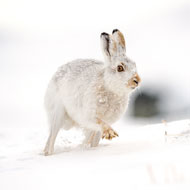
New report reveals large scale killings
Campaigners are urging the Scottish government to tackle mountain hare persecution, after a new report highlighted the scale of culling and recreational killing.
The report, published by the charity OneKind, names 25 companies that offer mountain hare shooting in Scotland. Of these, eight are promoted by the Scottish Country Sports Tourism Group (SCSTG), which lists government agencies Visit Scotland and Scottish Natural Heritage (SNH) as partner organisations.
One company used an image of hunters with the carcasses of dozens of hares, to promote their services on Visit Scotland. Another offered a day’s shooting of 80-100 hares for groups of nine for a price tag of £4,200. Both pages appear to have been removed following enquiries relating to the report, according to OneKind.
Mountain hare shooting is one of many country sports offered by game estates, and grouse moor managers also organise culls to protect red grouse for sport shooting.
Currently mountain hares are protected from 1 March to 31 July, meaning it is illegal to kill them without a licence during this time. Throughout the rest of the year, they can be culled freely without permission or transparency, so it is not possible to know how many are being killed.
However, estimates by Scottish Natural Heritage suggest around 25,000 were killed in 2006-07, which is thought to be 5-14 per cent of the total population. But these figures are based on voluntary returns from landowners; most hunts are conducted secretly in remote locations.
It is believed that around 40 per cent of the hares killed were shot for sport, 50 per cent in organised culls and 10 per cent to protect forestry interests.
Figures show licences were issued for the killing of 4,113 hares over a five-year period. Of these, 88 per cent were for just three sites.
The report also highlights eyewitness reports of three to five large scale hunts, which were carried out in the winter of 2016/17, in addition to publicly reported hunts in three areas between 2014 and 2016.
OneKind is urging the Scottish government to address the issue by introducing complete protection of mountain hares in national parks, and banning killings all year round, except under licence. The charity is also calling for the licensing arrangements to be strengthened and made more transparent.
Commenting on the report, Rob Raynor, SNH’s mammal specialist, said: “We continue to urge voluntary restraint by estates in control of mountain hares, and we don’t support large scale culls where the intention is to remove hares or significantly reduce their numbers. European legislation requires the mountain hare population is maintained at a healthy level.
“But it's legal to control mountain hares outside the closed season, and there is a need in some areas to do this to protect sensitive habitats and young trees. We’ll be working with the group that the Cabinet Secretary is forming to consider mountain hare management, as part of the moorland management review.”
Image © Adam Masterton



 The Veterinary Medicines Directorate (VMD) is inviting applications from veterinary students to attend a one-week extramural studies (EMS) placement in July 2026.
The Veterinary Medicines Directorate (VMD) is inviting applications from veterinary students to attend a one-week extramural studies (EMS) placement in July 2026.